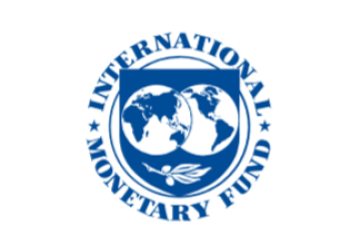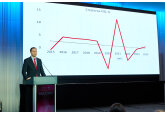
The IMF has approved the allocation of about $162.6 million for budgetary support to Moldova within the existing financing programs
According to the message of the International Monetary Fund, in particular, the Executive Board completed the 6th review under the program supported by the Extended Credit Facility (ECF) and the Extended Fund Facility (EFF), as well as the 2nd review under the program supported by the Resilience and Sustainability Facility (RSF). This allows for the allocation of 122.2 million Special Drawing Rights (about $162.6 million) under both programs, which can be used for budget support. Thus, Moldova's total payments within the current programs will amount to about $810.2 million. IMF experts note that Moldova's economic recovery is gaining momentum, and the growth is forecasted at 2.6 percent this year and 3 percent next year. The budget deficit is projected to fall from 5.2% of GDP in 2023 to 4.4% in 2024 and 4% in 2025, reflecting higher-than-expected revenues driven by strong wage and import growth and spending restraint. Inflation remains within the National Bank of Moldova's target corridor of 5% ±1.5 p.p. from October 2023. The outlook remains largely uncertain, with large downside risks, mainly related to the war in Ukraine and renewed energy shocks. At the same time, faster progress in structural reforms, including under the EU Growth Plan for Moldova, and steady progress towards EU accession represent upside risks. Fund experts point out that while the program's quantitative indicators have been strong, the implementation of structural reforms has been uneven. The authorities have met conditions related to financial inclusion, the insurance sector, and state-owned enterprises, and have submitted legislative amendments to parliament to strengthen the autonomy and governance of the NBM. Concerted action is expected to establish the Anti-Corruption Court and ensure that the Anti-Corruption Prosecutor's Office is adequately staffed. The transition from on-bill energy subsidies to targeted cash transfers took place in time for the start of the current heating season, and the government approved a disaster risk management program. Two other reform measures under the RSF are under implementation but will take longer to complete. Following the IMF Executive Board discussion, IMF Deputy Managing Director Kenji Okamura noted that although Moldova's economic recovery has picked up in 2024 and is expected to continue in 2025, risks remain skewed to the downside. He said the authorities should pursue prudent policies, maintain buffers and robust contingency plans, including in the energy sector, while promoting growth-friendly investments and reforms, which will also be supported by the EU accession process. Fiscal policy should remain on a path of gradual consolidation to create space for coping with shocks and for growth-enhancing investments, while continuing to protect the most vulnerable. Policies should also focus on improving budget planning and execution of capital investments, as well as raising revenues. While inflationary pressures have eased, energy and other shocks require a cautious, data-driven approach to monetary policy and the maintenance of adequate foreign exchange reserves. The prime rate is now at an acceptable level, and normalization of still high reserve requirements should be done gradually, closely monitoring developments in the real estate and foreign exchange markets. The current prudential requirements for shareholding in the banking sector should be maintained to ensure macro-financial stability. The upcoming Financial Sector Assessment Program (FSAP) will assess the development of the financial sector and set the reform agenda for the future. Kenji Okamura said that further progress in anti-corruption reforms is needed to further increase confidence in Moldova's institutions and to promote socio-economic development. In this context, the adoption of a law on the creation of a new Anti-Corruption Court and the provision of the Anti-Corruption Prosecutor's Office with the necessary personnel are key priorities. Efforts to strengthen the governance, autonomy and transparency of the National Bank of Moldova should continue. The authorities should also intensify the implementation of the RSF mechanism to complete the two pending reform measures under this review and advance the remaining climate policy agenda. Progress in this area is important for building climate resilience, incentivizing green investment finance, and supporting sustainable long-term development. // 18.12.2024 - InfoMarket.







